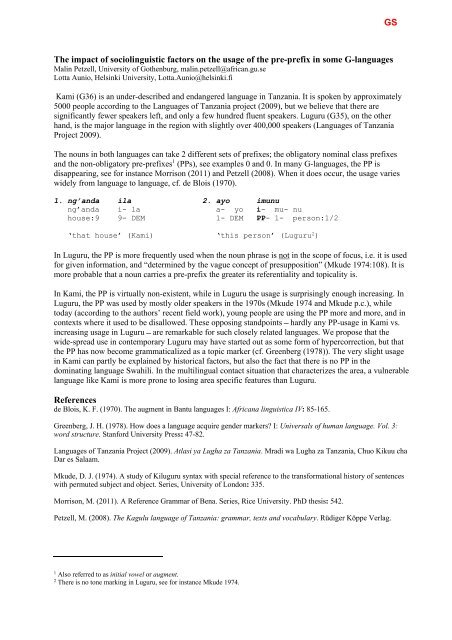here - 5th International Conference on Bantu Languages
here - 5th International Conference on Bantu Languages
here - 5th International Conference on Bantu Languages
You also want an ePaper? Increase the reach of your titles
YUMPU automatically turns print PDFs into web optimized ePapers that Google loves.
The impact of sociolinguistic factors <strong>on</strong> the usage of the pre-prefix in some G-languages<br />
Malin Petzell, University of Gothenburg, malin.petzell@african.gu.se<br />
Lotta Aunio, Helsinki University, Lotta.Aunio@helsinki.fi<br />
Kami (G36) is an under-described and endangered language in Tanzania. It is spoken by approximately<br />
5000 people according to the <strong>Languages</strong> of Tanzania project (2009), but we believe that t<str<strong>on</strong>g>here</str<strong>on</strong>g> are<br />
significantly fewer speakers left, and <strong>on</strong>ly a few hundred fluent speakers. Luguru (G35), <strong>on</strong> the other<br />
hand, is the major language in the regi<strong>on</strong> with slightly over 400,000 speakers (<strong>Languages</strong> of Tanzania<br />
Project 2009).<br />
The nouns in both languages can take 2 different sets of prefixes; the obligatory nominal class prefixes<br />
and the n<strong>on</strong>-obligatory pre-prefixes 1 (PPs), see examples 0 and 0. In many G-languages, the PP is<br />
disappearing, see for instance Morris<strong>on</strong> (2011) and Petzell (2008). When it does occur, the usage varies<br />
widely from language to language, cf. de Blois (1970).<br />
1. ng’anda íla 2. ayo imunu<br />
ng’anda i- la a- yo i- mu- nu<br />
house:9 9- DEM 1- DEM PP- 1- pers<strong>on</strong>:1/2<br />
‘that house’ (Kami) ‘this pers<strong>on</strong>’ (Luguru 2 )<br />
In Luguru, the PP is more frequently used when the noun phrase is not in the scope of focus, i.e. it is used<br />
for given informati<strong>on</strong>, and “determined by the vague c<strong>on</strong>cept of presuppositi<strong>on</strong>” (Mkude 1974:108). It is<br />
more probable that a noun carries a pre-prefix the greater its referentiality and topicality is.<br />
In Kami, the PP is virtually n<strong>on</strong>-existent, while in Luguru the usage is surprisingly enough increasing. In<br />
Luguru, the PP was used by mostly older speakers in the 1970s (Mkude 1974 and Mkude p.c.), while<br />
today (according to the authors’ recent field work), young people are using the PP more and more, and in<br />
c<strong>on</strong>texts w<str<strong>on</strong>g>here</str<strong>on</strong>g> it used to be disallowed. These opposing standpoints ̶ hardly any PP-usage in Kami vs.<br />
increasing usage in Luguru ̶ are remarkable for such closely related languages. We propose that the<br />
wide-spread use in c<strong>on</strong>temporary Luguru may have started out as some form of hypercorrecti<strong>on</strong>, but that<br />
the PP has now become grammaticalized as a topic marker (cf. Greenberg (1978)). The very slight usage<br />
in Kami can partly be explained by historical factors, but also the fact that t<str<strong>on</strong>g>here</str<strong>on</strong>g> is no PP in the<br />
dominating language Swahili. In the multilingual c<strong>on</strong>tact situati<strong>on</strong> that characterizes the area, a vulnerable<br />
language like Kami is more pr<strong>on</strong>e to losing area specific features than Luguru.<br />
References<br />
de Blois, K. F. (1970). The augment in <strong>Bantu</strong> languages I: Africana linguistica IV: 85-165.<br />
Greenberg, J. H. (1978). How does a language acquire gender markers? I: Universals of human language. Vol. 3:<br />
word structure. Stanford University Press: 47-82.<br />
<strong>Languages</strong> of Tanzania Project (2009). Atlasi ya Lugha za Tanzania. Mradi wa Lugha za Tanzania, Chuo Kikuu cha<br />
Dar es Salaam.<br />
Mkude, D. J. (1974). A study of Kiluguru syntax with special reference to the transformati<strong>on</strong>al history of sentences<br />
with permuted subject and object. Series, University of L<strong>on</strong>d<strong>on</strong>: 335.<br />
Morris<strong>on</strong>, M. (2011). A Reference Grammar of Bena. Series, Rice University. PhD thesis: 542.<br />
Petzell, M. (2008). The Kagulu language of Tanzania: grammar, texts and vocabulary. Rüdiger Köppe Verlag.<br />
1 Also referred to as initial vowel or augment.<br />
2 T<str<strong>on</strong>g>here</str<strong>on</strong>g> is no t<strong>on</strong>e marking in Luguru, see for instance Mkude 1974.<br />
GS


